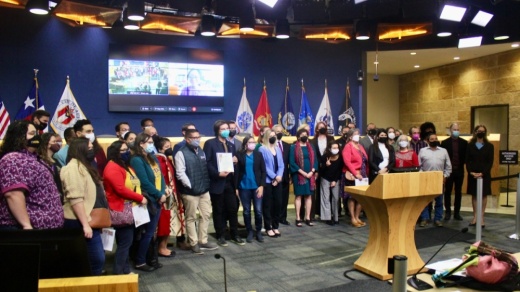Harsh winter conditions first started hitting Austin late Feb. 14, 2021, and caused widespread power blackouts and other infrastructure problems, in part given the limitations of Texas' isolated electric grid. State health officials said the storm and related issues led to the deaths of 246 people statewide, including 28 in Travis County, 21 of whom were recorded in Austin.
"Many lost power, and many struggled to stay warm; others lost shelter due to burst pipes and water damage; and most devastatingly of all we had fellow Texans and Austinites lose their lives," District 2 Council Member Vanessa Fuentes said. "There was no shortage of the challenges we faced."
The winter weather caused failures throughout local power and water systems for days as the city scrambled to respond to the disaster. In the wake of the storm, in-depth reviews of emergency protocols and readiness for the city, Austin Energy and Austin Water produced dozens of recommendations for improvements, and city auditors found Austin was largely unprepared to handle the situation.
In addition to those shortcomings, officials and community representatives at the Feb. 15 event also took time to highlight the resiliency of city residents during the storm. Small-business owner Nathan Ryan recalled how neighbors banded together to help one another amid the freeze and, despite tough conditions, even ended up throwing a spontaneous dance party in the streets.
"The fact that people are resilient is no excuse for systemic or other failures. What happened in February 2021 should never happen again. But Austin chose to respond to Winter Storm Uri not by throwing our hands up in despair but by coming together with compassion to do work necessary to serve and take care of one another," Ryan said.
Since last year, some area residents braced for a repeat in case winter weather once again shut down city infrastructure. The storm also sparked action at the state level throughout the year with the passage of several laws targeting power grid reliability, changes to utility oversight and operations, and an ongoing revamp of the Texas grid.
This year, the city and state emerged from an early February freeze largely unscathed, although this year's winter weather was not as extreme and did not last as long as the conditions amid Uri.
Following his colleagues' thanks for the community's response last February, District 4 Council Member Chito Vela went on to express frustration at the market system that contributed to blackouts and the profits of energy companies in the state during the freeze.
"Last year's storm was a tragedy, but it was also a crime. Our people deserve better than to freeze in the dark, to fear for their lives, and to lose friends and loved ones. We must change our system so this never happens again and companies cannot profit off of disaster," he said.
Mayor Steve Adler closed out the commemorative ceremony by issuing a proclamation naming February as Winter Storm Uri Remembrance Month.






